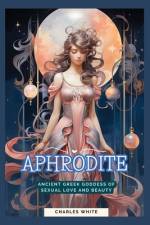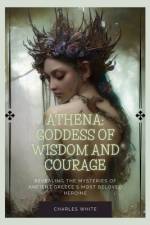- Ancient Greek Goddess of Sexual Love and Beauty
av Charles White
155,-
In the vast tapestry of mythology, few figures possess the timeless allure and enduring fascination of Aphrodite, the goddess of love and beauty. Across cultures and epochs, Aphrodite's archetype has captivated the human imagination, transcending the boundaries of time and space to become a symbol of feminine power, desire, and the eternal quest for love. At the heart of Aphrodite's archetype lies a complex interplay of beauty, desire, and divinity that speaks to the deepest recesses of the human soul. From her mythical origins to her timeless presence in art, literature, and popular culture, Aphrodite embodies the quintessential qualities of femininity and allure, captivating all who encounter her with her radiant presence and enchanting grace. One of the most compelling aspects of Aphrodite's archetype is its universality and adaptability across cultures and traditions. While Aphrodite is best known as a figure from ancient Greek mythology, her essence can be found in various forms throughout the world, from the Hindu goddess Lakshmi to the Norse goddess Freyja. Across cultures, Aphrodite's archetype embodies the universal themes of love, desire, and the pursuit of beauty, resonating with people from all walks of life and inspiring countless artistic interpretations and expressions. Aphrodite's archetype also holds a special significance in the realm of feminine empowerment and self-discovery. As a symbol of feminine beauty and sensuality, Aphrodite embodies the power of self-love and self-expression, encouraging individuals to embrace their unique beauty and embrace their desires without shame or inhibition. Through Aphrodite's archetype, individuals are reminded of the inherent value and worth of their own bodies and identities, reclaiming agency and autonomy over their lives and experiences. Furthermore, Aphrodite's archetype serves as a source of inspiration and empowerment for women and girls seeking to navigate the complexities of love and relationships in today's world. In a society that often places unrealistic expectations on women to conform to narrow standards of beauty and femininity, Aphrodite's archetype offers a counter-narrative that celebrates diversity, authenticity, and self-acceptance. Through Aphrodite's example, women are encouraged to embrace their own desires and pursue love on their own terms, free from societal judgment or constraints. In addition to its personal significance, Aphrodite's archetype also holds a profound cultural and artistic legacy that continues to shape our collective consciousness. From classical art and literature to contemporary film and fashion, Aphrodite's influence can be seen in a wide range of artistic expressions that celebrate beauty, love, and desire. Whether depicted in the serene marble statues of ancient Greece or the vibrant pop art of the modern era, Aphrodite's archetype serves as a timeless symbol of feminine power and allure, inspiring artists and creators to explore the depths of human emotion and experience. In conclusion, the eternal appeal of Aphrodite's archetype lies in its ability to transcend time and culture, resonating with people from all walks of life and inspiring countless interpretations and expressions. Through her mythical essence and enduring presence, Aphrodite continues to captivate the human imagination, reminding us of the timeless truths of love, beauty, and the eternal quest for fulfillment.





























